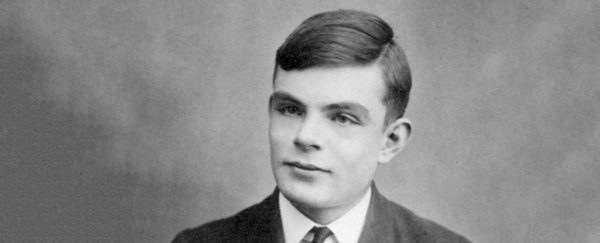Alan Turing, a founding father of computer science and artificial intelligence, was revealed Monday as the face of Britain's new 50-pound bank note.
Turing was also famed as a World War II codebreaker whose work was widely credited with hastening the end of the war and saving thousands of lives. But at the time, his achievements were overshadowed following his conviction of engaging in homosexual activity - then a criminal offense in Britain.
Mark Carney, governor of the Bank of England, said that "as the father of computer science and artificial intelligence, as well as [a] war hero, Alan Turing's contributions were far-ranging and pathbreaking." He called Turing "a giant on whose shoulders so many now stand."
Carney made the announcement Monday at Manchester's Science and Industry Museum, which will also feature an exhibition of the 12 finalists who were considered for the note, including theoretical physicist and cosmologist Stephen Hawking.
During World War II, Turing worked at Bletchley Park, where he helped to develop a machine that cracked the Enigma code used by Nazi Germany.
His work also laid the groundwork for the modern computer and artificial intelligence. His famous "Turing test" is still used as a benchmark for examining whether a machine can be considered to be thinking.
After the war, Turing pleaded guilty to a charge of "indecency" related to his homosexuality and was sentenced to chemical castration. In 1954 - at age 41 - he died after apparently poisoning himself with cyanide. A bitten apple was found by his bedside.
British Prime Minister Theresa May tweeted Monday that Turing's "pioneering work" played a "crucial part" in ending World War II. "It is only fitting that we remember his legacy and the brilliant contribution LGBT people have made to our country" on the new 50-pound note, she wrote.
Dermot Turing, Alan Turing's nephew, said in an emailed statement that the entire family was "delighted." He also praised the Bank of England for focusing on his uncle's work in computer development and computer science.
"It reminds us that this was what he was best known for during his own lifetime and - I think - what he would most wish to be remembered for today," he said.
The Oscar-winning 2014 biopic "The Imitation Game," starring Benedict Cumberbatch, brought further attention to the complex math genius and his team's role in the defeat of Adolf Hitler. On Monday, Cumberbatch told the BBC that he "couldn't think of a more deserving candidate." Turing was an "extraordinary human being, a unique mind, and he suffered a great deal in an intolerant time," he said.
Kim Sanders, a spokeswoman for Stonewall, a gay rights charity, said in a statement: "It's important that we remember and recognize the impact of LGBT figures throughout history, so it's great that Alan Turing will be the face on the new £50 bank note. It's vital that we celebrate LGBT history, which is often less visible, and make sure that we represent the diversity of those who paved the way before us."
She added: "The world we live in now is very different to Turing's time, and LGBT rights have come a long way. But the fight for true equality is far from over."
In 2013, after a lengthy campaign, Queen Elizabeth II granted Turing a royal pardon for his "crime" of homosexuality. In 2017, under legislation that became known as "Turing's law," Britain granted pardons to thousands of gay and bisexual men who were convicted of offenses related to their sexuality.
The new note, expected to enter circulation at the end of 2021, will include an image of Turing, ticker tape of his birth date in binary code, and a table and formula from a 1936 paper that introduced the concept of how computers could operate.
It will also include a quote from Turing about the ascent of computers, given to the Times of London newspaper in 1949 but perhaps just as apt today: "This is only a foretaste of what is to come, and only the shadow of what is going to be."
2019 © The Washington Post
This article was originally published by The Washington Post.
